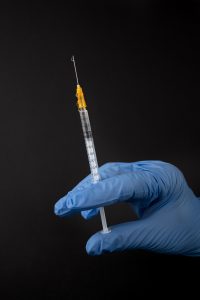Home » Heroin Addiction » What are the Signs and Symptoms of Heroin Addiction?
WHAT ARE THE SIGNS AND SYMPTOMS OF HEROIN ADDICTION?

Also known as H, junk or dope, heroin is fiercely addictive and available in the following forms:
White powder
Brown powder
Black sticky tar
Heroin is not only the most abused of all opiates, but is also the quickest-acting, meaning heroin abuse is associated with life-threatening overdose, as well as addiction.
People abuse heroin by many routes of administration, including:
Smoking
Snorting
Injecting intravenously
Ingesting heroin causes the drug to very rapidly cross your blood-brain barrier, triggering near-instant feelings of euphoria and positive mood. The speed of action and the intensity of effects heightens the addiction potential of heroin.
HOW ADDICTIVE IS HEROIN?
Using heroin in any form causes tolerance to form. When this occurs, you will require more heroin or more frequent doses of heroin to achieve the same effects.
If you attempt to combat tolerance by increasing the amount and frequency of heroin abuse, this will speed up the onset of physical and psychological dependent on this deadly opiate.
How, then, can you determine whether a loved one might be abusing heroin?
WHAT ARE THE SIGNS OF HEROIN ADDICTION?
The signs of heroin addiction, both physical and psychological, are broadly similar to the side effects of the drug.
The side effects associated with heroin use include:
Common side effects
Severe and atypical side effects
Heroin overdose symptoms.
SHORT-TERM HEROIN SIDE EFFECTS
NIDA (National Institute on Drug Abuse) states that these are among the most common short-term side effects triggered by heroin use:
Almost immediate rush of euphoria
Slowed heart rate once initial rush subsides
Nausea
Vomiting
Severe itching
Flushed skin
Prolonged drowsiness
Clouded thoughts
SEVERE AND ATYPICAL HEROIN SIDE EFFECTS
Some people who use heroin may experience severe and atypical side effects. This is often due to an adulterated batch of heroin. More frequently, drug traffickers are now cutting heroin with the deadly synthetic opioid fentanyl. This can trigger the following atypical side effects:
Anxiety
Shortness of breath
Palpitations
Headache
Tremors
Chest pains
BEHAVIORAL SIGNS OF HEROIN ADDICTION
Look out for the following behavioral markers of heroin addiction if you are concerned that a loved one might be abusing this powerful opiate:
Spending more time asleep
Unexpected and sudden need for money
Strained interpersonal relationships
Lying about heroin use or denying the existence of a problem
Withdrawing socially and spending more time alone
Wearing long sleeves to cover track marks
Failing to meet personal and professional commitments
Engaging in illegal activities
COGNITIVE SIGNS OF HEROIN ADDICTION
These are the most common cognitive side effects of abusing heroin:
Alternating between wakefulness and a drowsy state
Disorientation
Mental fogginess
Decreased mental focus
Inability to solve problems
WHAT ARE THE SYMPTOMS OF HEROIN ADDICTION?
The signs of heroin addiction will vary from person to person, but the symptoms of heroin addiction are universal.
Heroin addiction is clinically described as opioid use disorder or heroin use disorder. Like all substance use disorders, the symptoms of heroin addiction are outlined in APA’s DSM-5-TR, the most current edition of Diagnostic and Statistical Manual of Mental Disorders.
You will be asked the following questions based on your use of heroin over the previous year:
Taking larger amounts of heroin or using heroin for longer than intended.
- Making failed attempts to moderate or discontinue heroin use.
- Spending lots of time obtaining and using heroin, as well as recovering from the effects of heroin abuse.
- Tolerance developing so more heroin is required to deliver the same effects.
- Withdrawal symptoms manifest when the effects of heroin subside.
- Experiencing intense cravings for heroin.
- Using heroin in potentially dangerous situations such as before driving.
- Neglecting responsibilities at home, school, or work due to heroin abuse.
- Spending less time doing things you once enjoyed in favor of using heroin.
- Ongoing heroin abuse despite having a recurrent physical or mental issue that is caused or inflamed by heroin abuse.
- Continuing to abuse heroin in spite of problems in your closest relationships due to your heroin abuse.
The presence of two or three symptoms indicates mild heroin addiction. Moderate heroin addiction involves four or five symptoms presenting, while the manifestation of six or more symptoms leads to a diagnosis of severe opioid use disorders.
Fortunately, while heroin is fiercely addictive, both physically and psychologically, almost all heroin addictions respond positively to evidence-based treatment that involves:
MAT (medication-assisted treatment)
Psychotherapy
Counseling
HEROIN ADDICTION TREATMENT AT GRATITUDE LODGE
If you require help to address the physical and psychological aspects of heroin addiction, we can help you kickstart your recovery here at Gratitude Lodge in Southern California. Choose affordable luxury rehab in one of the following locations:
- Long Beach
- Newport Beach
- San Diego
Before you begin your treatment program, take advantage of our licensed medical detox to withdraw from heroin with as little danger and discomfort as possible. The treatment team may administer FDA-approved medications to mitigate cravings for heroin and to minimize the intensity of withdrawal symptoms.
After a week or so of heroin detox, you will be ready to engage with one of our inpatient or intensive outpatient treatment programs to promote sustained recovery.
MAT (medication-assisted treatment) can also be effective throughout ongoing treatment, reducing the frequency of cravings for heroin, and promoting sustained abstinence. MAT is always most effective when delivered in combination with behavioral therapies. You can access these interventions at our heroin addiction treatment center:
Psychotherapy (talk therapies such as CBT or DBT)
Individual counseling
Group counseling
Family therapy
Holistic therapy
12-step immersion program
When you are committed to reclaiming your life from heroin addiction, begin your recovery journey by taking advantage of supervised withdrawal Gratitude Lodge, before transitioning into inpatient or outpatient heroin rehab. Call admissions today at 800-994-2184.











